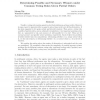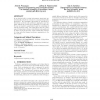118
click to vote
AAAI
2010
15 years 3 months ago
2010
We consider approval voting elections in which each voter votes for a (possibly empty) set of candidates and the outcome consists of a set of k candidates for some parameter k, e....
109
Voted
ATAL
2008
Springer
15 years 4 months ago
2008
Springer
Recent work by Procaccia, Rosenschein and Zohar [14] established some results regarding the complexity of manipulation and control in elections with multiple winners, such as elec...
144
Voted
AAAI
2008
15 years 4 months ago
2008
Usually a voting rule requires agents to give their preferences as linear orders. However, in some cases it is impractical for an agent to give a linear order over all the alterna...
103
click to vote
SIGECOM
2005
ACM
15 years 8 months ago
2005
ACM
We determine the communication complexity of the common voting rules. The rules (sorted by their communication complexity from low to high) are plurality, plurality with runoff, ...
109
Voted
ATAL
2007
Springer
15 years 8 months ago
2007
Springer
In an election held in a noisy environment, agents may unintentionally perturb the outcome by communicating faulty preferences. We investigate this setting by introducing a theore...


